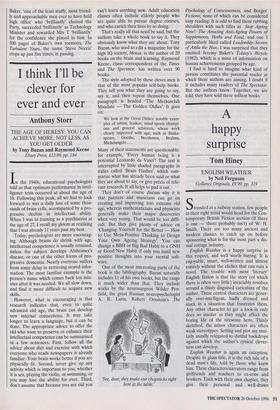I think I'll be clever for ever and ever
Anthony Storr
THE AGE OF HERESY: YOU CAN ACHIEVE MORE, NOT LESS, AS YOU GET OLDER by Tony Buzan and Raymond Keene
Ebuly Press, £12.99, pp. 184 n the 1940s, educational psychologists told us that optimum performance in intel- ligence tests occurred at about the age of 16. Following this peak, all we had to look forward to was a daily loss of some thou- sands of brain cells, accompanied by a pro- gressive decline in intellectual ability. When I was in training as a psychiatrist at the age of 27, I recall my gloom at realising that I was already 11 years past my best.
Today, psychologists are more encourag- ing. Although brains do shrink with age, intellectual competence is usually retained, unless the subject develops Alzheimer's disease, or one of the other forms of pro- gressive dementia. Nearly everyone suffers from some delay in retrieving stored infor- mation. The most familiar example is the person's name which comes back ten min- utes after it was needed. We all slow down, and find it more difficult to acquire new skills.
However, what is encouraging is that research indicates that, even in quite advanced old age, the brain can develop new internal connections. It may take longer to learn a language, but it can be done. The appropriate advice to offer the old who want to preserve or enhance their intellectual competence can be summarised in a few sentences. First, follow all the advice about diet and exercise with which everyone who reads newspapers is already familiar. Your brain works better if you are physically fit. Second, never give up any activity which is important to you, whether it is sex, playing the violin, or swimming, or you may lose the ability for ever. Third, don't assume that because you are old you
I
can't learn anything new. Adult education classes often include elderly people who are quite able to pursue degree courses, and who enrich their lives by so doing.
That's really all that need be said, but the authors take a whole book to say it. They obviously know what they are about. Tony Buzan, who used to edit a magazine for the high IQ society, Mensa, is the author of 20 books on the brain and learning. Raymond Keene, chess correspondent of the Times and The Spectator, has written over 90 books.
The style adopted by these clever men is that of the most popular self-help books. They tell you what they are going to say, say it, and then repeat themselves. One paragraph is headed 'The Methuselah Mandate — The Golden Oldies'. It goes on: We look at the Great Oldies: notable exam- ples of artists, leaders, mind sports champi- ons and general achievers, whose work clearly improved with age, such as Shake- speare, Goethe, Beethoven, Brahms, Michelangelo ...
Many of their statements are questionable: for example, 'Every human being is a potential Leonardo da Vincil The text is interrupted by little shaded paragraphs in italics called 'Brain Flashes', which sum- marise what has already been said or what they are about to say, or give précis of rele- vant research. It all helps to pad it out.
They don't of course discuss why it is that painters and musicians can go on creating and improving into extreme old age, whereas mathematicians and physicists generally make their major discoveries when very young. That would be too diffi- cult. But they give plenty of advice on `Changing Yourself for the Better — How to Use Meta-Positive Thinking to Design Your Own Ageing Strategy'. You can change a BBH or Big Bad Habit to a GNH or Good New Habit if only you instil new positive thoughts into your mental soft- ware.
One of the most interesting parts of the book is the bibliography. Buzan naturally includes 11 of his own books, but the range is much wider than that. They include works by the neurosurgeon Wilder Pen- field, the great Russian neuropsychologist A. R. Luria, Robert Ornstein's The `See, dear, they make our chopsticks right here at the table.' Psychology of Consciousness, and Borges' Fictions, none of which can be considered easy reading. It is odd to find these rubbing shoulders with such titles as Stop Ageing Now!: The Amazing Anti-Ageing Powers of Supplements, Herbs and Food, and one I particularly liked called Leadership Secrets of Attila the Hun. I was surprised that they omitted Jeremy Baker's Tolstoy's Bicycle (1982), which is a mine of information on human achievements grouped by age.
I find it hard to imagine what kind of person constitutes the potential reader at which these authors are aiming. I doubt if it includes many readers of The Spectator. But the authors know. Together, we are told, they have sold three million books.


















































































 Previous page
Previous page